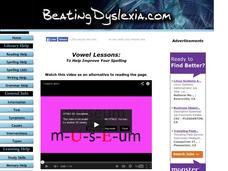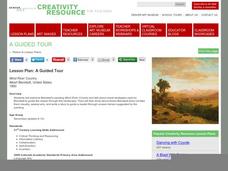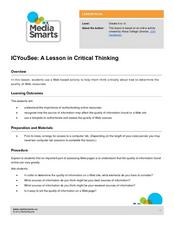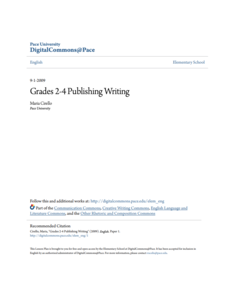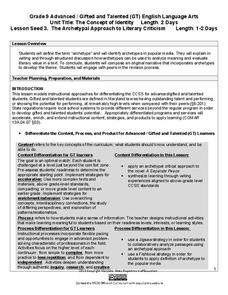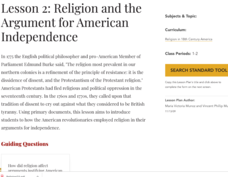Manchester University
Veteran’s Day
Before honoring courageous veterans, get to know more about who they are and why November 11th is a special day. Scholars obtain such information through a read aloud of Eve Bunting's The Wall, grand conversation, and...
Teacher's Corner
Hey Batter, Wake Up!
Does jet lag affect a baseball team's performance in games? Read about how a baseball team's chance of winning a game can be affected by traveling over one, two, and three time zones. Readers then respond to five short answer questions...
Curated OER
Reading Food Labels
Young nutritionists plan nutritional meals by using the USDA's Food Guide Pyramid. Before constructing their meal plans, they take a close look a food labels and learn how to decipher them. In today's world of obese and unfit children,...
Curated OER
The Ancient Art of Shadow Puppet Plays
Shadow puppetry has an ancient past, it is also a great way to build oral expression and reading fluency. Young thespians research folk tales, compare and contrast reality and fantasy, then create and perform a shadow puppet play based...
Curated OER
Exploring Arizona's Biotic Communities Lesson 3: A Day in the Life
Junior ecologists examine Arizona's biotic communities and research an animal or plant that is found in this community. In this lesson, learnerss write a narrative essay about their assigned animal or plant. They research online and in...
Curated OER
EFL Lesson Plan: How to Teach EFL/ESL Students Interview Skills
Explore communication in this interview skills instructional activity. English learners identify the techniques native English speakers use when speaking directly to a potential employer. They read handouts detailing seven steps to...
Curated OER
T3 Lesson Plan: Number 3
Sixth graders investigate local water. For this water cycle lesson, 6th graders take samples from surrounding water sources. Students record data from the samples, compare and graph the results.
Curated OER
Technopoet - Poetry Lesson Plans
Practice word processing while writing different types of poems. First, elementary and middle schoolers use Word templates to write poetry. They use rhyming and descriptive words as they work with clipart, text wrapping, and picture...
Curated OER
Vowel Lessons: To Help Improve Spelling
There are a few things every good speller knows: spelling rules, vowel sounds, and word endings. Help your learner with dyslexia become a more efficient speller with a few tips from a dyslexia expert. Included in the lesson is a video,...
Curated OER
Shizuko’s Daughter: Unsent Letter
Have you ever wanted to tell a character what you really thought of him or her? Use a instructional activity based on Kyoko Mori's Shizuko's Daughter to encourage learners to write a letter in response to a character's...
Houghton Mifflin Harcourt
American Stories: Extra Support Lessons (Theme 2)
Here's a packet designed especially for those kids who need extra support with the basic concepts in the Houghton Mifflin Harcourt thematic units on American stories.
Poetry4kids
Playing With Your Food Poem Lesson
What's more fun than playing with your food? Writing a poem about it! A quick and straightforward lesson guides young writers through the steps of writing a funny, well-structured poem about combining sports and food.
Curated OER
Lesson Plan: A Guided Tour
Albert Bierstadt's painting Wind River Country shows viewers how a reader progresses through a story. Your class studies the light and dark areas, how the eye moves across the painting, and what attracts the audience to the work, and...
Curated OER
Lesson Ideas for Comparing and Contrasting Content
Here are three lesson ideas to help students learn how to compare and contrast information in any content area
Federal Reserve Bank
Beatrice’s Goat: A Lesson on Savings Goals
Youngsters learn the meaning of saving and how to reach savings goals by first reading a story of a young Ugandan girl who is gifted a goat, and then discovering the opportunity costs of savings decisions made by her and her family.
Curated OER
ICYouSee: A Lesson in Critical Thinking
Stress the importance of authenticating online resources and understanding the sources of websites' information with this activity. Using a Web-based activity, the lesson prompts young learners to think critically about determining the...
iCivics
Step 3: Become an Expert
Have you ever been called an expert before? Pupils analyze how to break down sources of information using group work and individual skills. They begin to understand the tools of becoming an expert on a topic by using subtopics and...
Pace University
Publishing Writing
Scholars become familiar with tagline literature with the help of the story, Alexander and the Horrible, No Good, Very Bad, Terrible Day by Judith Viort. After a read-aloud and whole-class discussion, leveled groups complete...
Curated OER
Lesson: Paul Chan: Tree of Life
Paul Chan's work has been known to show the cycle of change. Learners explore the concept of change by analyzing his work and reading the poem "For Which it Stands." They consider symbolism, communication, art, and society as they use...
Curated OER
Lesson: Urs Fischer: Controlling our Logic, Metaphors, and Semantics
Kids use poetry and contemporary art to start thinking about logic and personal expression. They read Sylvia Plath's poem "Metaphor," and critically examine the art of Urs Fischer. After working though a few logic problems they write...
Deliberating in a Democracy
Cyberbullying—Lesson Plan
Learners examine cyberbullying. In this lesson on democracy, young scholars discuss the different ways to deal with cyberbullying. They then take a position on the question of whether a democracy should allow schools to take action...
Maryland Department of Education
The Concept of Identity Lesson 3: The Archetypal Approach to Literary Criticism
As class members continue their study of approaches to literary criticism, readers examine the symbolism and archetypal patterns in John Knowles' A Separate Peace, and how these parallels are used to develop a theme...
National Endowment for the Humanities
Lesson 1: The First Great Awakening
High schoolers examine the First Great Awakening and how it affected religious belief in colonial America. They read and analyze primary source documents, explore various websites, and write a five-paragraph essay examining the beliefs...
National Endowment for the Humanities
Lesson 2: Religion and the Argument for American Independence
Young scholars examine how religion affected arguments justifying American independence. They read and analyze primary source documents, and write an essay analyzing how Americans used religious arguments to justify revolution against a...
Other popular searches
- Guided Reading Lessons
- 2nd Grade Reading Lessons
- Shared Reading Lessons
- First Grade Reading Lessons
- 1st Grade Reading Lessons
- Reading Lessons on Frogs
- Lessons on Map Reading
- Guided Reading Lessons Plans
- Quick Reading Lessons
- Elementary Reading Lessons
- Adventure Reading Lessons
- Reading Lessons Plans








